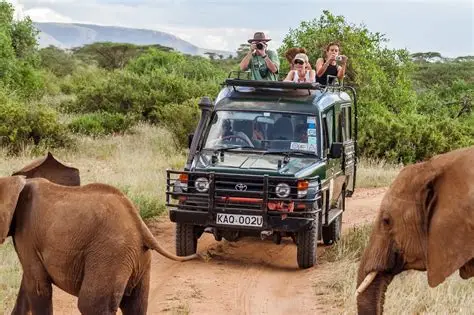Eco-Safaris Explained: Exploring Kenya Responsibly
A safari in Kenya is more than an adventure it’s a connection to nature, wildlife, and local communities. But as travel grows, so does the responsibility to protect the very places we love.
That’s where eco-safaris come in. At Touch Wild, we believe in safaris that preserve, respect, and give back ensuring Kenya’s wild beauty thrives for generations to come.
Here’s everything you need to know about eco-safaris and how to explore Kenya responsibly.
1. What Is an Eco-Safari?
An eco-safari is a journey designed to minimize environmental impact while supporting conservation and local communities.
It’s about traveling mindfully staying in eco-lodges, using renewable energy, reducing waste, and respecting wildlife habitats.
But it’s also about connection: learning from local people, understanding Kenya’s ecosystems, and leaving a positive footprint wherever you go.
2. Why Choose an Eco-Safari in Kenya?
Kenya is a pioneer in sustainable tourism. Many conservancies and lodges across the country operate under eco-principles, protecting wildlife while empowering nearby communities.
When you choose an eco-safari, you:
-
Support wildlife conservation and anti-poaching efforts
-
Create jobs and education opportunities for locals
-
Help fund habitat restoration and sustainable development
-
Reduce your carbon footprint through responsible practices
Every eco-conscious choice helps keep Kenya’s natural balance intact.
3. Where to Go for the Ultimate Eco-Safari
Kenya is filled with destinations where conservation meets comfort:
-
Maasai Mara Conservancies – Community-run conservancies that protect land and wildlife while sharing revenue with Maasai families.
-
Lewa Wildlife Conservancy – A UNESCO site and global model for conservation, home to rhinos, elephants, and Grevy’s zebras.
-
Ol Pejeta Conservancy – Known for its endangered species sanctuary and responsible tourism programs.
-
Amboseli National Park – Works closely with communities to balance wildlife protection and pastoral life.
Each of these destinations proves that luxury and responsibility can coexist beautifully.
4. How to Be a Responsible Safari Traveler
Small actions make a big impact. Here’s how you can explore responsibly:
✅ Choose lodges and camps with eco-certifications (like Eco Tourism Kenya’s bronze, silver, or gold ratings).
✅ Pack reusable bottles and eco-friendly toiletries.
✅ Respect wildlife keep a safe distance and never feed animals.
✅ Support local artisans and farmers instead of imported souvenirs.
✅ Offset your travel carbon footprint where possible.
At Touch Wild, we encourage guests to travel thoughtfully enjoying Kenya’s wonders while protecting its wild heart.
5. The Future of Safari Travel
Eco-safaris are shaping the future of tourism in Africa. They’re not a trend they’re a movement toward balance, awareness, and harmony with nature.
By choosing an eco-safari, you become part of that movement. You help ensure that Kenya’s lions still roar, elephants still roam, and communities continue to thrive alongside nature.
Conclusion
An eco-safari isn’t about giving up comfort it’s about traveling with purpose.
It’s about knowing that every step you take in the wild contributes to something bigger.
At Touch Wild, we design journeys that celebrate Kenya’s beauty while protecting its future because the wild should stay wild, forever.


